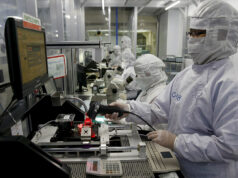New Customs boss kicks off stint with warning
By Melissa Luz T. Lopez
Senior Reporter
CUSTOMS Commissioner Isidro S. Lapeña lost no time in warning his men of a hard-line approach to corruption as he took over the bureau yesterday, announcing a one-strike policy as part of “internal cleansing.”

The former director general of the Philippine Drug Enforcement Agency (PDEA) took the helm of the Bureau of Customs (BoC) from former Marine captain Nicanor E. Faeldon, who resigned earlier this month.
During the turnover ceremony at the BoC main office the Port of Manila, Mr. Lapeña said President Rodrigo R. Duterte’s marching order was to “stop corruption and increase revenue earnings” in the embattled bureau, which has been counted among the most corrupt in government.
He replaces Mr. Faeldon after over a year in office. Customs has seen short tenures even among past commissioners, who either opted to resign or were sacked due to irregularities in the bureau.
“In conformity with the marching order of the President… everyone can expect major changes in the bureau,” Mr. Lapeña said in his inaugural speech before Customs officials and employees.
The bureau chief also said he will “try to surpass” the agency’s revenue targets: “We will start first with the first mandate: corruption. When we address this, along the way that will also consequently improve collections.”
The BoC — the second-largest tax collector that contributes about a fifth to total state revenues — raked in P246.98 billion in revenues from January-July, up by 11.5% year on year but short of its P257.1-billion target for the period. Customs is expected to collect P467.9 billion this year.
Mr. Lapeña, a former police general, said his top priority will be the removal of pasalubong (welcome cash gift for incoming officials) and tara (grease money) culture in the agency, which came to light during recent Congressional investigations on the P6.4-billion methamphetanine shipment from China that cleared Customs.
“Similar to what I did with PDEA, I will implement a one-strike policy to boost internal cleansing, which of course shall be supported by intensified counter-intelligence efforts,” the new Customs chief said.
Pressed for details, Mr. Lapeña said Customs employees implicated in corrupt acts will be relieved from their post as investigation starts and will be sacked once reports are verified.
At the same time, Mr. Lapeña said he will employ a “carrot-and-stick” approach to encourage professionalism in the bureau. He added that he will work with existing Customs employees, but will bring in some of his own men to key positions in order to introduce “transformative” measures.
Some of Mr. Lapeña’s batchmates from the Philippine Military Academy Class of 1973 were present during the ceremony, including Defense Secretary Delfin N. Lorenzana.
The new Customs chief did not give specifics of his reform plans, saying the bureau leadership was to meet that afternoon. But Mr. Lapeña said he will prioritize faster bureau-wide computerization to improve import processing, a key feature provided under Republic Act No. 10863, or the Customs Modernization and Tariff Act, that was signed into law in May last year.



